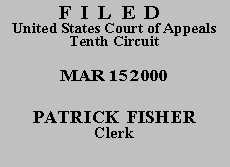

| UNITED STATES OF AMERICA,
Plaintiff-Appellee, |
|
| v. | |
| LATRINA JOHNSON,
Defendant-Appellant. |
|
Latrina Johnson seeks a certificate of appealability to appeal the district court's dismissal of her 28 U.S.C. § 2255 motion as untimely. We deny a certificate of appealability and dismiss the appeal.
On June 1, 1996, Johnson pleaded guilty to conspiracy to possess with the intent to distribute cocaine base. On June 17, 1997, she was sentenced to 135 months' imprisonment. Johnson did not file a direct appeal. On March 6, 1998, she filed a pro se "Motion for Sentence Reduction § 3582(b)." The court concluded Johnson could not seek relief under § 3582(b) and treated the filing as a request for relief pursuant to 28 U.S.C. § 2255. On June 3, 1998, the court received a letter from Johnson stating she did not want her motion construed as a § 2255 motion and that "[i]f this is the way the court has filed it please [accept] my motion to withdraw it without prejudice." Record, Doc. 45 at 2. On June 26, 1998, the court permitted Johnson to withdraw her motion for sentence reduction, noting that "in choosing to withdraw this motion, Johnson should recognize that arguments she may wish to raise by a subsequent § 2255 motion may be time barred." Id. at 3.
On October 19, 1998, Johnson filed a "Motion for Leave to File Out-of-Time Motion for Relief Under 28 U.S.C. § 2255." She contended that she mistakenly believed the one-year period of limitation began with the district court's dismissal of her § 3582 motion on June 26, 1998, and asked the court to excuse her untimeliness based upon her misunderstanding. The court found Johnson had not "identified any extraordinary circumstance that would justify equitable relief" from the one-year limitation and dismissed the motion as untimely.
A prisoner is precluded from filing a § 2255 motion more than one year after his or her conviction becomes final. See United States v. Simmonds, 111 F.3d 737, 744 (10th Cir. 1997). The one-year period begins to run on the date the conviction becomes final. 28 U.S.C. § 2255(1). For purposes of the Antiterrorism and Effective Death Penalty Act of 1996 (AEDPA), Johnson's conviction was final when the time to file a direct appeal expired. See United States v. Burch, 202 F.3d 1274, 2000 WL 121292 (10th Cir. 2000) (holding that "judgment of conviction is final after the time for seeking certiorari review has expired"). Johnson had ten days after sentencing to file an appeal, making her conviction final on June 27, 1997. She had until June 29, 1998, to file a § 2255 motion since June 27 was a Saturday. Her § 2255 motion was untimely filed on October 19, 1998.
Johnson contends she was unaware of the time requirements for filing a § 2255 motion and seeks to invoke the equitable tolling provision of 28 U.S.C. § 2244(d)(1)(D), which provides that in some circumstances the one-year limitation begins on "the date on which the factual predicate of the claim or claims presented could have been discovered through the exercise of due diligence." Johnson presents no compelling arguments that she could not have timely filed her § 2255 motion and she has not specified the events or facts that she was unable to discover. See Miller v. Marr, 141 F.3d 976, 978 (10th Cir. 1998) (noting that defendant had "provided no specificity regarding the alleged lack of access and the steps he took to diligently pursue his federal claims" and concluding that "[i]t is not enough to say that the [] facility lacked all relevant statutes and case law or that the procedure to request specific materials was inadequate"). In granting Johnson's request to withdraw her initial motion, the district court informed Johnson that arguments in a subsequent § 2255 might be time barred. The district court did not err in finding Johnson's § 2255 motion was untimely filed.
We DENY a certificate of appealability and DISMISS the appeal. The mandate shall issue forthwith.
Entered for the Court
Mary Beck Briscoe
Circuit Judge
*.This order and judgment is not binding precedent, except under the doctrines of law of the case, res judicata, and collateral estoppel. The court generally disfavors the citation of orders and judgments; nevertheless, an order and judgment may be cited under the terms and conditions of 10th Cir. R. 36.3.